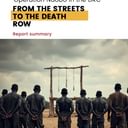
A coalition of 23 human rights groups, including Human Rights First, Human Rights Watch, and Reprieve, has urged the United States government to issue sanctions against foreign government officials who they say have used the death penalty to repress political dissent by torturing peaceful protesters into confessing to capital offenses they did not commit.
In a September 12, 2017 letter to Secretary of State Rex Tillerson and Treasury Secretary Steven Mnuchin, the non-governmental organizations (“NGOs”) asked the United States to invoke provisions of the Global Magnitsky Act, a new law that “authorizes the President to impose financial sanctions and visa restrictions on foreign persons in response to certain human rights violations and acts of significant corruption.” The law, enacted in 2012 and expanded in 2016, was named after Sergei Magnitsky (pictured), a Russian lawyer and whistleblower who was beaten and died in a Moscow prison in 2009.
The letter called the sanctions available under the act “a potentially revolutionary tool” to deter human rights abuses by “those that would use violence to silence dissent and maintain their grip on power.”
The NGOs requested that the State Department and U.S. Treasury investigate 15 cases “from every region of the world” that, they say, “involve horrific stories of torture, enforced disappearance, murder, sexual assault, extortion and bribery.” They ask the U.S. to investigate Bahrain’s Chief of Public Prosecution, Ali bin Fadhul Al Buainain, for his alleged involvement in the torture of Shia political activist Ali al-Singace and two others, and their execution on January 15, 2017. The rights groups say Bahraini prosecutors “sought and obtained the harshest possible punishment, the death sentence, with full awareness that the defendants claimed their confessions had been coerced and that the case had been marred from the start by this and other grave violations of due process.”
They also seek investigation of judges on Saudia Arabia’s Specialized Criminal Court, who “repeatedly rel[ied] on confessions allegedly obtained through torture” in convicting members of religious minorities for participating in pro-democracy protests in 2011. The NGOs say the judges also “sentenced several of the defendants to death for conduct allegedly undertaken while they were minors,” in violation of international law and the International Convention on the Rights of the Child.
Reprieve’s Director, Maya Foa, who oversees the organization’s strategic initiatives on the death penalty and extreme human rights abuses, called the use of torture to force confessions, executing children, and using the death penalty to suppress free speech “grotesque rights abuses that fly in the face of American values.” She said the U.S. should use the powers of the Global Magnitsky Act “to hold to account the individuals responsible for gross human rights abuses, and to save the lives of innocent young [protesters].”
Senator John McCain, one of the authors of the Global Magnitsky Act and its amendments, said the involvement of non-governmental human rights organizations is crucial to the success of the Act. In a statement to Reuters, he said he “will continue working to ensure the administration enforces the law and utilizes this powerful tool to advance freedom and justice around the world.”
Rob Berchinski, Senior Vice President of Policy at Human Rights First, said “[o]ur process is designed to assist the government.… Now the question is simply one of political will.” The Act requires the White House to report to Congress by December 10 on sanctions it has imposed under the law.
M. Kahn and W. Stroebel, Rights groups target police, spy chiefs globally under new U.S. law, Reuters, September 13, 2017; Press Release, NGOs Identify Human Rights Abusers, Corrupt Actors for Sanctions Under U.S. Bill, Human Rights First, September 13, 2017; US urged to sanction officials who abuse protesters, Reprieve, September 13, 2017.
Read the NGOs’ Letter to Secretaries Tillerson and Mnuchin, September 12, 2017.


